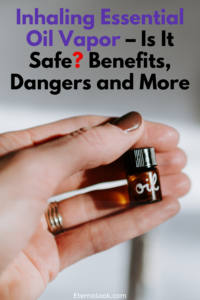Essential oils might be trendy right now, but do they really work? This article will cut through all the hype and help you distinguish fact from fiction.
Keep reading to find out whether essential oils really work and learn how to use them safely.
Table of Contents
Safely Inhaling Essential Oil Vapor
So how do you stay safe if you want to inhale essential oils? You might want to consider getting a proper oil diffuser. This disperses a fine mist of oil that can gently be inhaled.
Some people also like to gently sniff a drop of essential oil placed on a cotton ball or rubbed into their skin, which can be safe as long as you do not place it directly under your nose.
Most oils are only dangerous if consumed in excessive amounts. To stay safe, you need to research each oil’s dosage safely and follow dilution guidelines.
Avoid using oils that irritate mucous linings in the throat and lungs. Skip directly inhaling these oils:
- Cinnamon
- Clove
- Thyme
- Peppermint
- Bay
- Lemongrass
How Do Essential Oils Work?
To make essential oils, the active compounds of a plant are extracted, concentrated, and put into an oil or liquid like substance to preserve it.
For aromatherapy, these oils work by affecting our sense of smell. The human brain is easily influenced by the smells around it. Certain sense can induce wakefulness, relaxation, focus, and more.
Is It Ok To Breath In Essential Oils?
Usually, essential oils are fine to breathe as long as you use properly diluted doses, do not heat the oils excessively, and do not inhale oils that irritate the throat.
There are several studies that show it can be alright to breathe in essential oils and may result in positive effects.
A review of some of the most common types of essential oils used in aromatherapy found that users did not suffer side effects from using them occasionally (1).
However, it is worth noting that pregnant women, children, and babies should avoid excessive exposure to breathing in essential oils (2).
What Essential Oils Are Good For Inhaling?
It is possible to safely inhale all sorts of essential oils, but this does not mean you should start using any oil for aromatherapy.
Some popular oils can irritate the mucous membranes, and others are just ineffective as an aroma therapeutic agent.
If you want to get noticeable and positive effects from inhaling essential oils, try oils that have been tested and approved over decades of use. Some of the best essential oils to inhale are:
- Grapefruit
- Cedarwood
- Lavender
- Tangerine
- Spearmint
- Fir
- Lemon
Can You Put Essential Oils In A Vape?
Plenty of people wonder if they can get the fun of vaping and the health benefits of essential oils by sticking their oil in a vape. Technically you can, but it really isn’t a good idea.
The problem with vaping essential oils is that a vape pen heats products up far more than an essential oil diffuser. This can release abnormal volatile organic compounds that may damage your body.
Vaping an essential oil also puts you in contact with a much higher concentration than usual. This can lead to mouth and skin rashes, trouble breathing, coughs, lung damage, and more.
What Not To Do With Essential Oils
If you want to be as safe as possible while getting the best results from essential oils, never do these things:
- Apply undiluted oil to your skin without doing a patch test first
- Use oil on infants
- Apply photosensitive oils like grapefruit, lime, or angelica and go in the sun
- Inhale diffused oils for more than 60 minutes at a time.
- Leave essential oils in reach of a child
- Use oils without checking proper dosage methods
- Apply oils to the eyes or mucous membranes
Top 10 Popular Essential Oils
Here’s a breakdown of some of the most commonly used essential oils.
- Spearmint – Reduces headaches and nausea
- Tea tree – Cleanses and purifies
- Lemon – Deodorizes and encourages alertness
- Lavender – Calms, relaxes, and aids with sleep
- Grapefruit – Invigorates and refreshes
- Oregano – Purifies air and improves breathing
- Sweet orange – Boosts mood and soothes anxiety
- eucalyptus – Opens up airways and kills bacteria
- Clary sage- Reduces depression, balances hormones, and boosts circulation
- Frankincense – Promotes focus and calms stress
Health Benefits of Essential Oils
One of the main benefits of essential oils is their ability to reduce anxiety and stress. 2012 research found the inhalation of sweet orange oil could immediately reduce anxiety parameters (3).
Researchers have found that oils can have general anti-inflammatory, antibacterial, and antimicrobial effects, so they may be a good choice for making natural cleaners or fighting off infections (5).
Another study from 2014 linked lavender inhalation to improved sleep quality (4). People who smelled this oil were less likely to wake up throughout the night.
Safety and Side Effects
The main side effects of essential oils tend to be rashes or reddened skin from applying too strong of an oil to sensitive skin.
Those who inhale oils that irritate the lungs may have a cough, mucus buildup, or runny nose.
Though rare, it is possible to have a severe allergic reaction to essential oils. Seek immediate medical attention if you experience swelling or have difficulty breathing.

Sources
(1) https://www.sciencedirect.com/science/article/pii/S2221169115001033
(2) https://journals.sagepub.com/doi/abs/10.1177/146642409911900407
(3) https://www.ncbi.nlm.nih.gov/pubmed/22849536